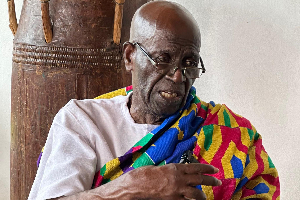Capital crunch on the international financial market is slowly killing interest by international financial institutions to commit more funds to sectors like water, power telecommunications in Africa.
The Minister of Finance, Yaw Osafo Maafo acknowldeged in the 2003 Budget Statement that the general slack in global finance could affect the country’s attempt to source funding for various projects.
He did elaborate, but some financial experts have attributed the decision of the government to put the water privatisation on hold until further notice to the unwillingness of financial institutions to commit more cash to those sectors.
The controversy that has dogged water privatisation, especially in Africa, makes the sector an unlikely candidate for future investments. The wait and see attitude adopted by financial institutions has been blamed on the events leading to and after September 11 and the looming Iraq-USA war.
In February, the Water Sector Restructuring Secretariat announced that the government had deferred the implementation of the Private Sector Participation in Water (PSP) scheme scheduled to start this month to a later date.
State owned Daily Graphic quoted Captain Victor Ansah, an official of the secretariat as saying that the decision to hold on was due to bureaucratic procedures involving the preparation of bidding and the transaction documents and a thorough study of the companies shortlisted for implementation of the project. The companies vying for contract are Biwater/Aqua Mundo, Undeo, Sauz and General Suaz.
Additional information reaching the Weekend Agenda says one of the intitial bidders, Bechtel, has pulled out of the competition due to pressure by some NGOs in the United States. The NGOs late last year invaded the offices of Bechtel urging the company to pull out.
When reached for his comments on the unfolding trend in the water sector, Rudolf-Amengo, Coordinator of the National Coalition Against Water Privatisation (NCAP) said NCAP had earlier drawn the government’s attention to the fact that the companies shortlisted have no good record in handling water efficiently. “If the government has now seen the need to scrutinise the companies, the better for all of us,” says Amengo.
He explained that in pushing the water privatisation agenda, the government made Ghanaians to believe that the companies were going to bring all the money into the country. He said the two companies that would win the bid were expected to borrow $70m each from the operational fund of the World Bank at one per cent interest rate.
According to Amengo, the loan has now been slashed to $30m, meaning the government would be compelled to look for the extra $40m each to cushion the companies. “After telling Ghanaians that the companies will bring in all the money, the government is now finding it difficult to tell the public that it will have to borrow additional money for the companies to operate,” Amengo alleges.
He suggested that the government should scrap the water restructuring programme and open debate for the restructuring of the Ghana Water Company Limited (GWCL). Part of the restructuring should aim at making GWCL a kind of public trust company to deliver water to deprived areas as part of the government’s social responsibility.
Urban areas like Accra, Kumasi, Tema and Takoradi could then have municipal water companies. Amengo noted that the provision of water to the poor should be a budgetary issue and that the World Bank and the IMF should give the government the free hand to make more budgetary allocations to water as a first step to reducing poverty.
He regretted the decision by the World Bank and the IMF to make the commercialisation of water one of the conditions for more budgetary support to the government, adding, “it is not in the national interest. We should be given the freedom to debate the options.”
On the way forward, Amengo suggested that part of the solution to the water problem should start with making it compulsory for developers to make provision for harvesting rainwater for domestic use. “There has to be a use policy in the country to discuss how we can harvest rain water for car washing and watering lawns and gardens, instead of using treated water.”
He said harvesting water should be part of the housing and planning policy, which could be achieved by introducing a housing subsidy to enable the poor to build houses to specification.
Meanwhile, World Bank, the brain behind water privatisation endorsed a Water Resources Strategy on 26 February. It is aimed at providing more effective assistance to countries using water as a vehicle for increasing growth and reducing poverty. The World Bank believes that by making efficient use of existing water resources, the new strategy will contribute to the international development goal of halving poverty by 2015.
The Bank says the newly released strategy reflects the demand from poor countries for a more balanced approach in investment in water infrastructure. The bank notes that a central water management challenge in most countries is agriculture, which accounts for over 70 per cent of water use.
General News of Friday, 7 March 2003
Source: Public Agenda












